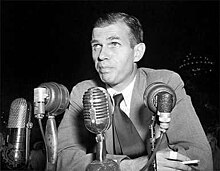
Back ألجر هيس Arabic الجير هيس ARZ الجر هیس AZB Alger Hiss Czech Alger Hiss German Alger Hiss Esperanto Alger Hiss Spanish Alger Hiss Basque الجر هیس Persian Alger Hiss Finnish
Alger Hiss | |
|---|---|
 Hiss testifying in 1948 | |
| Born | November 11, 1904 |
| Died | November 15, 1996 (aged 92) New York City, U.S. |
| Alma mater | |
| Known for | Being accused of espionage |
| Criminal charge | 2 counts of perjury |
| Criminal penalty | 2 concurrent terms of 5 years in prison |
| Criminal status | Released after 3 years and 8 months |
| Spouses | |
| Relatives |
|
Alger Hiss (November 11, 1904 – November 15, 1996) was an American government official accused in 1948 of having spied for the Soviet Union in the 1930s. The statute of limitations had expired for espionage, but he was convicted of perjury in connection with this charge in 1950. Before the trial Hiss was involved in the establishment of the United Nations, both as a US State Department official and as a UN official. In later life, he worked as a lecturer and author.
On August 3, 1948, Whittaker Chambers, a former US Communist Party member, testified under subpoena before the House Un-American Activities Committee (HUAC) that Hiss had secretly been a communist while in federal service. Hiss categorically denied the charge and subsequently sued Chambers for libel. During the pretrial discovery process of the libel case, Chambers produced new evidence allegedly indicating that he and Hiss had been involved in espionage. A federal grand jury indicted Hiss on two counts of perjury. After a mistrial due to a hung jury, Hiss was tried a second time, and in January 1950 he was found guilty and received two concurrent five-year sentences, of which he eventually served three and a half years.
Arguments about the case and the validity of the verdict took center stage in broader debates about the Cold War, McCarthyism, and the extent of Soviet espionage in the United States.[1] Since Hiss's conviction, statements by involved parties and newly exposed evidence have added to the dispute. In the 1990s, two former senior Soviet military officers responsible for the Soviet Union's military intelligence archives stated, following a search of those archives, that the "Russian intelligence service has no documents proving that Alger Hiss cooperated with our service somewhere or anywhere," and that Hiss "never had any relationship with Soviet intelligence."[2][3] The 1995 Venona Papers provided evidence for the theory that Hiss was a Soviet spy.[4] Author Anthony Summers argued in 2000 that since many relevant files continue to be unavailable, the Hiss controversy will continue to be debated, with political divisions marking belief in Hiss's innocence or guilt.[5][6] Hiss himself maintained his innocence until his death in 1996.
- ^ Rosenbaum, Ron (July 16, 2007). "Alger Hiss Rides Again". Slate. Archived from the original on December 11, 2007. Retrieved November 13, 2007.
- ^ Hartshom, Lewis. Alger Hiss, Whittaker Chambers and the Case That Ignited McCarthyism. Oxford University Press. p. viii.
- ^ "The Alger Hiss Story » Interpreting Russian Files".
- ^ Barron, James (August 16, 2001). "Online, the Hiss Defense Doesn't Rest". The New York Times. Retrieved August 29, 2009. See also:
- "... the vast majority of modern American historians today and particularly those specializing in domestic Cold War accept Chambers' overall version of events."
- "Yet the weight of historical evidence indicates that Hiss was ... a member of the communist underground and a Soviet spy." Elson, John (November 25, 1996). "Gentleman and Spy?". Time. Archived from the original on July 5, 2007. Retrieved August 2, 2007.
- "The case against Hiss, which has been strong but controversial ever since his conviction for perjury... is now overwhelming as a result of new evidence... from the VENONA decrypts, KGB files made available to Weinstein and Vassiliev... and Hungarian interrogation records of Hiss's fellow agent Noel Field."Andrew, Christopher; Mitrokhin, Vasili (1999). The Sword and the Shield: The Mitrokhin Archive and the Secret History of the KGB. New York: Basic Books. p. 591. ISBN 978-0-465-00310-5.
- "In the end, the publication of the Venona intercepts ... settled the matter—to all but the truest of believers." Stanley I. Kutler (August 6, 2004). "Rethinking the Story of Alger Hiss". FindLaw.
- "Most historians have conceded the argument to Weinstein. They have done so, however, not because the evidence against Hiss is clear and definitive, but because the evidence box—filled as it is with a morass of circumstantial detail—leaves them the easy option of finding him guilty of some form of espionage activity during his murky relationship with Chambers." Bird, Kai; Chervonnaya, Svetlana (Summer 2007). "The Mystery of Ales". American Scholar.
- "The question of his guilt or innocence remains controversial." Svetlana Chervonnaya Hiss, Alger (1904 – 1996) Archived October 26, 2021, at the Wayback Machine DocumentsTalk.com. Accessed: 2010-09-09.
- In 1997, Allen Weinstein, in the second edition of his 1978 book Perjury: The Hiss-Chambers Case, calls the Venona evidence "persuasive but not conclusive".Weinstein 1997 pp. 5: pp. 316–317: pp 7: pp. 37, 46–47: pp. 153–157: pp. 163–170: pp. 499: pp. 502: pp. 519: pp. 512
- ^ Anthony Summers, The Arrogance of Power: The Secret World of Richard Nixon (New York, London: Penguin-Putnam Inc, 2000), p. 77.
- ^ Navasky, Victor (June 27, 2003). "Allen Weinstein's Docudrama". Archived from the original on June 27, 2003. Retrieved December 7, 2022.
© MMXXIII Rich X Search. We shall prevail. All rights reserved. Rich X Search